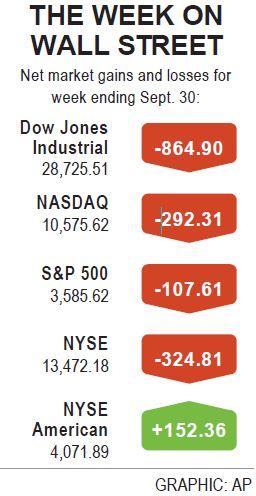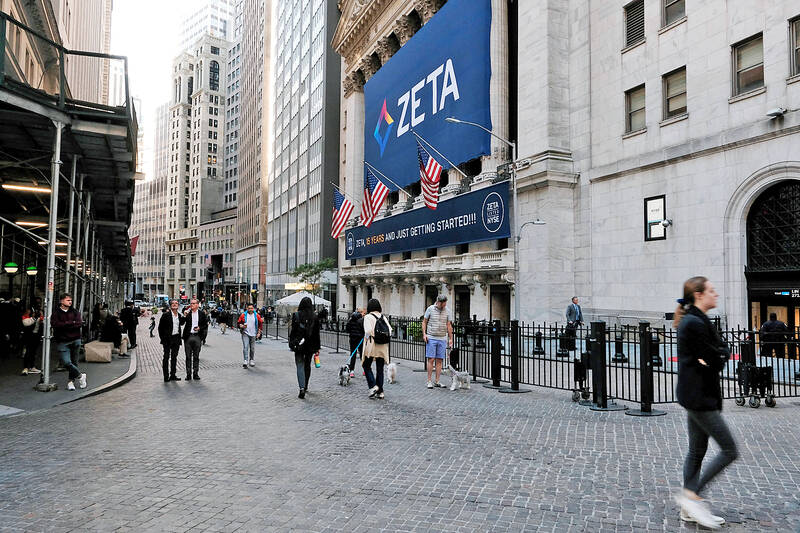The S&P 500 on Friday closed the books on its steepest September decline in two decades, skidding across the finish line of a tumultuous quarter fraught with historically hot inflation, rising interest rates and recession fears.
All three major indexes veered to a sharply lower end, after quashing a brief rally early in the session.
The S&P and the Dow Jones Industrial Average notched their third consecutive weekly declines, and all three indexes posted their second straight monthly losses.

In the first nine months of the year, Wall Street suffered three quarterly declines in a row, the longest losing streak for the S&P and the NASDAQ since 2008 and the Dow’s longest quarterly slump in seven years.
“It’s another ugly day to end an ugly quarter in what’s looking like a very ugly year,” said Ryan Detrick, chief market strategist at Carson Group in Omaha, Nebraska. “Investors will look back and realize this was the year the Fed pulled a total 180 on their views on inflation and quickly turned incredibly hawkish.”
RATTLED

Photo: AFP
The US Federal Reserve has rattled markets by engaging in its most relentless series of interest rate hikes in decades to rein in stubbornly high inflation, which has many market participants eyeing key economic data for signs of a looming recession.
“The realization that the Fed is doing anything they can to combat 40-year-high inflation has investors worried they will push the economy over the edge and into recession,” Detrick added.
The US Department of Commerce’s personal consumption expenditures report did little to assuage those fears, showing that while consumers continue to spend, the prices they are paying have accelerated, drifting further beyond the Fed’s inflation target and all but ensuring the central bank’s hawkish monetary policy would continue longer than investors had hoped.
DIRE WARNINGS
Recession fears also echoed through dire warnings from Nike Inc and cruise operator Carnival Corp, both citing inflation-related margin pressures.
Shares of the companies tanked by 12.8 and 23.3 percent respectively.
The Dow Jones Industrial Average fell 500.1 points, or 1.71 percent, to 28,725.51, ending the week down 2.92 percent; the S&P 500 lost 54.85 points, or 1.51 percent, to 3,585.62, falling 2.91 percent for the week; and the NASDAQ Composite dropped 161.89 points, or 1.51 percent, to 10,575.62, ending the week down 2.69 percent.
Among the 11 major sectors of the S&P 500, real estate was the sole gainer, while utilities tech suffered the largest percentage losses.
Apple Inc, Microsoft Corp, Amazon.com and Nike weighed heaviest.
Corporate earnings reports for the quarter that ended with Friday’s closing bell would begin landing in a few weeks, and analyst expectations are trending downward.
Analysts now forecast annual S&P 500 earnings growth of 4.5 percent, on aggregate, down from the 11.1 percent estimate when the quarter began.
Quarter-end fund reallocations and so-called “window dressing” is likely contributed to the session’s volatility.

Taiwan Semiconductor Manufacturing Co (TSMC, 台積電) last week recorded an increase in the number of shareholders to the highest in almost eight months, despite its share price falling 3.38 percent from the previous week, Taiwan Stock Exchange data released on Saturday showed. As of Friday, TSMC had 1.88 million shareholders, the most since the week of April 25 and an increase of 31,870 from the previous week, the data showed. The number of shareholders jumped despite a drop of NT$50 (US$1.59), or 3.38 percent, in TSMC’s share price from a week earlier to NT$1,430, as investors took profits from their earlier gains

In a high-security Shenzhen laboratory, Chinese scientists have built what Washington has spent years trying to prevent: a prototype of a machine capable of producing the cutting-edge semiconductor chips that power artificial intelligence (AI), smartphones and weapons central to Western military dominance, Reuters has learned. Completed early this year and undergoing testing, the prototype fills nearly an entire factory floor. It was built by a team of former engineers from Dutch semiconductor giant ASML who reverse-engineered the company’s extreme ultraviolet lithography (EUV) machines, according to two people with knowledge of the project. EUV machines sit at the heart of a technological Cold

TAIWAN VALUE CHAIN: Foxtron is to fully own Luxgen following the transaction and it plans to launch a new electric model, the Foxtron Bria, in Taiwan next year Yulon Motor Co (裕隆汽車) yesterday said that its board of directors approved the disposal of its electric vehicle (EV) unit, Luxgen Motor Co (納智捷汽車), to Foxtron Vehicle Technologies Co (鴻華先進) for NT$787.6 million (US$24.98 million). Foxtron, a half-half joint venture between Yulon affiliate Hua-Chuang Automobile Information Technical Center Co (華創車電) and Hon Hai Precision Industry Co (鴻海精密), expects to wrap up the deal in the first quarter of next year. Foxtron would fully own Luxgen following the transaction, including five car distributing companies, outlets and all employees. The deal is subject to the approval of the Fair Trade Commission, Foxtron said. “Foxtron will be

INFLATION CONSIDERATION: The BOJ governor said that it would ‘keep making appropriate decisions’ and would adjust depending on the economy and prices The Bank of Japan (BOJ) yesterday raised its benchmark interest rate to the highest in 30 years and said more increases are in the pipeline if conditions allow, in a sign of growing conviction that it can attain the stable inflation target it has pursued for more than a decade. Bank of Japan Governor Kazuo Ueda’s policy board increased the rate by 0.2 percentage points to 0.75 percent, in a unanimous decision, the bank said in a statement. The central bank cited the rising likelihood of its economic outlook being realized. The rate change was expected by all 50 economists surveyed by Bloomberg. The